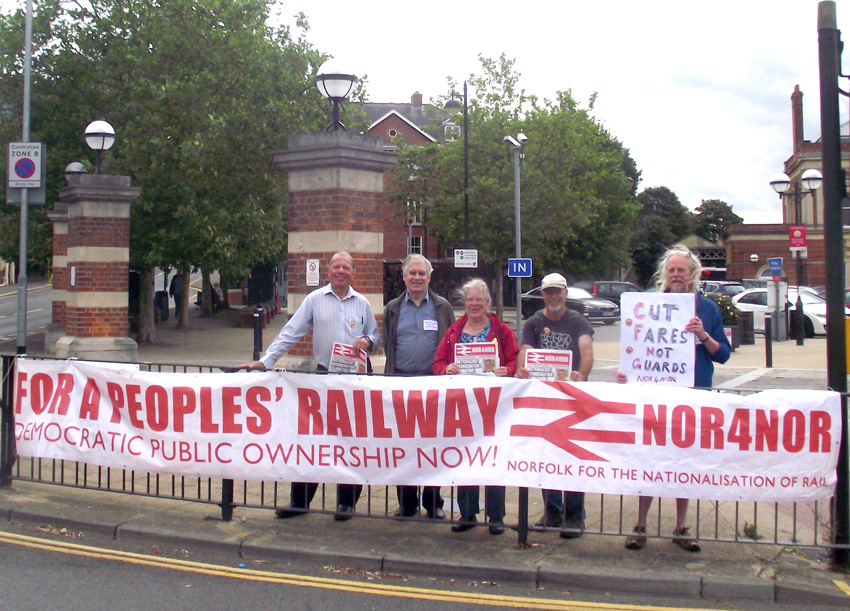
THERE is to be a 2.8% rail fares rise for 2020.
The increase will be based on the Retail Prices Index (RPI) inflation measure of 2.8% for July.
The figure is likely to lead to an increase of more than £100 in the annual cost of getting to work for many commuters.
The cost of most train fares is set by train companies themselves, but about 40% of fares in England, Scotland and Wales are regulated so that they are only allowed to rise by an amount pegged to the RPI rate of inflation in July the previous year.
These regulated fares include annual season tickets.
The TUC yesterday renewed its call for the railway to be renationalised, stating it would lead to lower ticket prices.
‘We’re already paying the highest ticket prices in Europe to travel on overcrowded and understaffed trains.
‘The number one priority should be running a world-class railway service, not subsidising private train companies,’ said TUC general secretary Frances O’Grady.
At the start of this year, train fares went up by an average of 3.1% in England and Wales and 2.8% in Scotland.
The rail union RMT has accused the government of playing into the hands of the private rail companies and showing complete contempt for passengers at a time when it should be encouraging as many people as possible to use the rail network.
RMT polling of rail passengers has revealed that rising rail fares have already forced large numbers to consider using other forms of transport for both leisure and work purposes.
A publicly owned and nationally integrated railway, which was not focused on draining profits from the system, would mean revenue could be reinvested in the network and in making fares affordable for all.
RMT General Secretary Mick Cash said: ‘Yet another rail fare hike is a kick in the teeth for the UK’s rail passengers who are already paying over the odds to travel on overcrowded, clapped out and unreliable trains. This is just corporate welfare for the greedy train companies on an industrial scale.
‘With the colossal sums bled out of our railways by private companies, including the £1.2 billion ripped-off by the rolling stock outfits as exposed by RMT, it is crystal clear that a return to public ownership would free up the funds needed to both hold down fares and invest in services.
‘The private rail racket has left Britain’s passengers paying the highest fares in Europe to travel on clapped out and unreliable services. It is time for it to end.
‘Privatisation is at odds with an affordable and sustainable rail network – we need a publicly owned and nationally integrated railway now.’
NOR4NOR supporters were protesting at Norwich rail station on Wednesday from 10-THERE is to be a 2.8% rail fares rise for 2020.
The increase will be based on the Retail Prices Index (RPI) inflation measure of 2.8% for July.
The figure is likely to lead to an increase of more than £100 in the annual cost of getting to work for many commuters.
The cost of most train fares is set by train companies themselves, but about 40% of fares in England, Scotland and Wales are regulated so that they are only allowed to rise by an amount pegged to the RPI rate of inflation in July the previous year.
These regulated fares include annual season tickets.
The TUC yesterday renewed its call for the railway to be renationalised, stating it would lead to lower ticket prices.
‘We’re already paying the highest ticket prices in Europe to travel on overcrowded and understaffed trains.
‘The number one priority should be running a world-class railway service, not subsidising private train companies,’ said TUC general secretary Frances O’Grady.
At the start of this year, train fares went up by an average of 3.1% in England and Wales and 2.8% in Scotland.
The rail union RMT has accused the government of playing into the hands of the private rail companies and showing complete contempt for passengers at a time when it should be encouraging as many people as possible to use the rail network.
RMT polling of rail passengers has revealed that rising rail fares have already forced large numbers to consider using other forms of transport for both leisure and work purposes.
A publicly owned and nationally integrated railway, which was not focused on draining profits from the system, would mean revenue could be reinvested in the network and in making fares affordable for all.
RMT General Secretary Mick Cash said: ‘Yet another rail fare hike is a kick in the teeth for the UK’s rail passengers who are already paying over the odds to travel on overcrowded, clapped out and unreliable trains. This is just corporate welfare for the greedy train companies on an industrial scale.
‘With the colossal sums bled out of our railways by private companies, including the £1.2 billion ripped-off by the rolling stock outfits as exposed by RMT, it is crystal clear that a return to public ownership would free up the funds needed to both hold down fares and invest in services.
‘The private rail racket has left Britain’s passengers paying the highest fares in Europe to travel on clapped out and unreliable services. It is time for it to end.
‘Privatisation is at odds with an affordable and sustainable rail network – we need a publicly owned and nationally integrated railway now.’
NOR4NOR supporters were protesting at Norwich rail station on Wednesday from 10-12.00 against the rise.